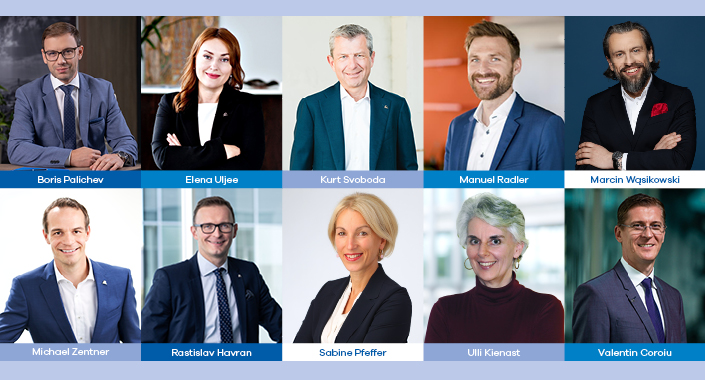
Gender diversity at UNIQA: Through the lens of our leaders
Read interview



Does "glocalisation" mean the end of globalisation? Is it the best of both worlds, "global" and "local"? And what does UNIQA have to do with it? A conversation around megatrends and their applicability.
We are a regional company in our markets, says Juri Reich from Strategy & Transformation. Regional is more than just a spatial concept, it means being in my world, in your world, says Paul Brandstätter, Product & Market Austria. This is exactly what our customers appreciate about us, says Customer Account Manager Lisa Ifkovits, PC Graz.
Editorial team: "Glocalisation" describes the mixture of globalisation and localisation. Where do you see this trend?
Lisa: I can clearly feel this merging of the global and the local in my own environment, for example climate change. We have a global issue to which we respond locally at the regional headquarters in Graz, with our photovoltaic system and the green façade.
Paul: There are both and we need both. I can consume the global regionally today. Without digitalisation, glocalisation would not even be possible.
Juri: From a macroeconomic point of view, glocalisation is a countermovement to globalisation. We have seen, for example, that supply chains are vulnerable to globalisation. Nevertheless, it remains important for our level of prosperity.
Editorial team: Where does UNIQA stand in the field of tension between global and local?
Paul: That is a question of perspective. We are a multinational group with strong regional roots and defend top market positions across the group.
Juri: Unlike Allianz or Generali, which are globally positioned, we are a regional player in Central and Eastern Europe. With all the advantages and disadvantages. The Ukraine war, for example, has a greater impact on us.
Paul: We want to meet our customers locally and digitally where they are, in their lives.
Lisa: That's exactly what they appreciate about us.
There are both, globalisation and localisation, and we need both. I can consume the global regionally today. Without digitalisation, glocalisation would not even be possible.
Editorial team: Has globalisation had its day?
Paul: We have seen that pure efficiency thinking is not effective. With just-in-time warehousing, only one ship has to be stuck in the Suez Canal and we don't have microchips, with immediate effects on our digitalised way of working.
Lisa: We notice our dependence, we feel the effects of local crises, currently in the energy market, in the price of electricity.
Juri: If Europe was not globally competitive, we would not be doing well regionally. Globalisation is 99 per cent a good thing, because it brings prosperity. Countries that sewed T-shirts 30 years ago now build cars. Without globalisation, we could never lift so many people out of poverty. But it is true that to a certain extent we must free ourselves from dependence on global supply chains. It is bad if we think too shortsightedly and have vital medicines produced somewhere far away for two cents less. That's why there is also a countermovement that takes the risk into account.
Lisa: But at the same time, certain countries may be kept down, if you think about working conditions in developing countries, for example. We only benefit if there are others who are worse off economically.
Juri: Some countries have made it, for example South Korea. It is also up to a country itself whether it introduces rule-of-law institutions and democracy, for example.
Paul: We realised in the COVID period that we need parallelism, that processes need a second path, that we need to secure infrastructure. And we managed to keep it running.
Juri: ... about globally developed things like MS Teams.
Editorial team: How secure is our prosperity?
Paul: The current ten percent inflation is hurting many people. We can see that our prosperity is still fragile.
Juri: I don't see the West itself in danger, it remains the strongest block. But Europe has relied too much on the USA. We now know that we must become more independent in security policy and energy policy.
Paul: Which brings with it certain costs that we are perhaps now more willing to bear again.
If Europe was not globally competitive, we would not be doing well regionally. Globalisation is 99 per cent a good thing, because it brings prosperity. But it is true that to a certain extent we must free ourselves from dependence on global supply chains.
Editorial team: Back to the impact on UNIQA: The department “Customer and Market Austria” is currently working on an urbanisation project. What is that?
Paul: We want to take the needs of customers in urban environments more into account. For example, through the multilingualism of documents, but also through new access points, through sports communities, fitness communities.
Lisa: We could do with foreign language documents. All offers and applications in English at the click of a button, that would be important to accompany an English counselling interview.
Juri: We can really improve here. For example, we have a rather small market share in Vienna. How can we meet the needs of students, young people and migrants in the reality of their lives?
Paul: People are social beings, in the city it's not so much geographical spaces that bring people together, it's areas of interest, communities.
Lisa: I notice the urban-rural difference clearly in counselling. In the city, the customers want a quick transaction, preferring to do it without an appointment after work, whereas in the countryside they often demand a personal conversation, even over a coffee at home instead of in our office. Older people in particular take this for granted, according to the motto, "you want to sell me something, now come to me first". Customers from rural areas also make recommendations more easily. It would be an idea in the city to offer goodies for recommendation. Customer XY brings me a new customer and gets a bonus discount, for example.
Paul: ...at best supported by digital tools. The digital UNIQA stamp card. It's always about picking up the customers where they are. We need ways to translate our traditional advisory strength into the digital age.
Lisa: Today, I can have a virtual consultation at 7.30 p.m. if the customer doesn't have time beforehand, and it's still personal. I can therefore visit clients in their comfort zone.
Paul: Co-browsing documents, for example, would be something that would help us. Insurance is a business of trust.
I notice the urban-rural difference clearly in counselling. In the city, the customers want a quick transaction, preferring to do it without an appointment after work, whereas in the countryside they often demand a personal conversation, even over a coffee at home instead of in our office.
Editorial team: To what extent do we take regional differences into account in our products and consulting?
Lisa: In health insurance, for example, a Styrian is certainly better off with a rate that depends on the province than a Lower Austrian who also goes to hospital in Vienna.
Paul: The regional identity is certainly there, and it makes sense that we respond to it. At the same time, we must not overuse it. The reality of my life is more important than where I am exactly spatially. For example, I have very specific demands when I have just started a family and had the first child. That's why we respond to the different needs with construction kits. Customers are also only willing to pay for something they need. Let's think of the dog in household insurance. Modularisation is the key to success and it's all about convenience.
Lisa: The more flexible a product can be, the more interesting it is for the market. I was critical of the new “Privatschutz Wohnen” product at first, but after the first consultations and contracts, I think it's good. It has everything I need for my customers.
Juri Reich heads the Inhouse Consulting department in the Strategy and Transformation division. Like all members of his team, he has his professional roots in management consulting. Juri's work focuses on our Group-wide strategy UNIQA 3.0, as well as on numerous other strategically relevant projects in different areas of the company.
Lisa Ifkovits joined UNIQA in June 2022 and has been working in the field service at PC Graz ever since. What she particularly appreciates about her job is the diversity of her customers, getting to know them personally and responding to their different needs. She particularly enjoys demand-oriented work.
Paul Brandstätter has been working at UNIQA since 2009 in various functions – currently as Head of Product & Market. His focus is always on developing the best products and services for our customers.
From left to right: Juri Reich, Lisa Ifkovits, Paul Brandstätter
Read interview
Read article
Read article


.jpg)